The German psychologist Hermann Ebbinghaus published Über das Gedächtnis (“On Memory”) in 1885.
This was a work which revealed the groundbreaking experiments he conducted on himself to study how humans learn and forget information over time.

It is somewhat ironic that his name has been lost to history.
Nevertheless, his findings endure through well-researched and verified concepts such as the forgetting curve, spacing effect, and memory flashcards. All critical in mastering the CFA Program.
Forgetting Curve
One of Ebbinghaus’s most significant contributions is the forgetting curve, which illustrates the decline of memory retention over time.
His experiments showed that memory loss is exponential, meaning that we forget information rapidly after learning it, but the rate of forgetting slows down as time progresses.
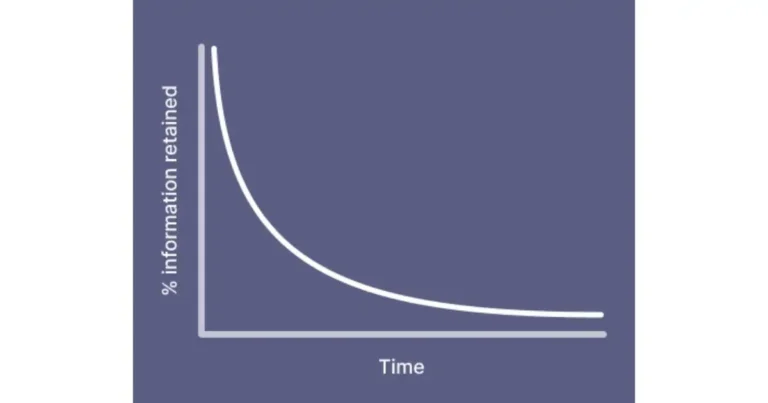
This is a massive problem for CFA exam preparation.
Candidates are required to digest about 8kg (17.6 lbs) of information per exam spread over many months of study.
(~ No wonder I always put on weight during study prep ~)
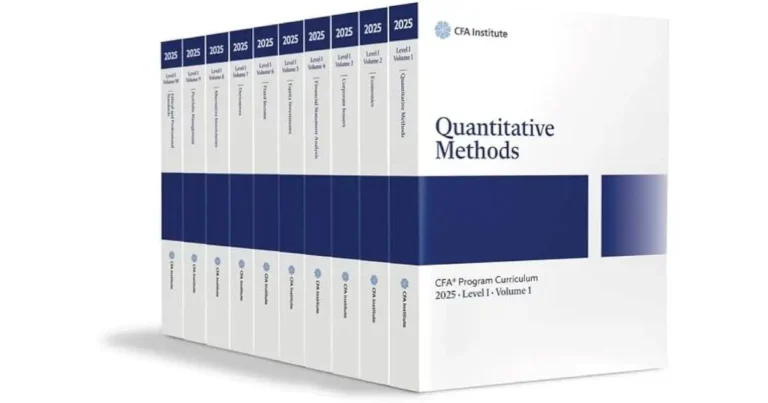
It is not uncommon for candidates who, after months of study, finally complete the curriculum only to realize that they have forgotten what was covered at the start.
Fortunately, Ebbinghaus not only studied the problem of the forgetting curve, but how learning can be structured to overcome our brains’ shortfall.
The Spacing Effect
In order to understand the mechanisms of memory, Ebbinghaus used himself as the subject in his experiments.
He would study lists of random combinations of letters, meticulously recording and analyzing his own learning and forgetting patterns.
Through this process he discovered the “spacing effect”, which demonstrated that information is more effectively retained when study sessions are spaced out over time rather than crammed into a short period.
When you first learn something, you retain a high percentage of that information.
But As time passes, you start to forget what you learned.
If you review the information (first review), your retention spikes back up.
After the first review, you begin to forget again, but at a slower rate.
Reviewing the material again (second review) boosts your retention to a higher level.
With each subsequent review (third review and beyond), the forgetting curve becomes less steep, meaning you retain information for a longer period before needing another review.
In essence, spacing out your reviews helps to reinforce your memory each time, leading to better long-term retention compared to cramming all your study sessions together.
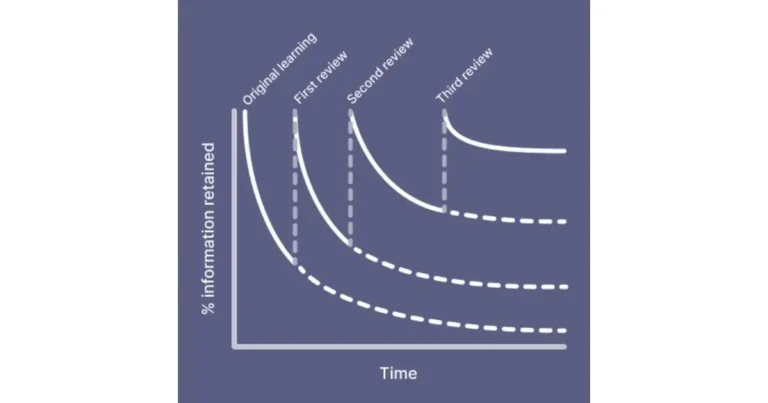
CFA candidates can utilize the spacing effect to enhance their study efficiency and retention of vast amounts of material.
One simple method is to plan periodic reviews for each section.
For example, after studying a section, review it after one day, then after one week, then after one month.
Use a calendar or a study planner to keep track of these reviews.
Incorporate practice questions and mock exams into your study schedule. These should be spaced out to cover the material repeatedly over time.
Periodically assess your understanding and retention through quizzes and self-tests. Identify weak areas and revisit them using the spacing effect.
Flashcards
Ebbinghaus’s findings laid the groundwork for the development of several learning techniques used in modern educational practices.
For example, in the 1970s, Sebastian Leitner, a German science journalist, expanded on the spacing effect and developed the “Leitner System”, a practical implementation of spaced repetition using flashcards.
The system involves sorting flashcards into groups based on how well the learner knows each one, with more frequent reviews for those cards that are less well-known.
This method made the concept of spaced repetition more accessible and practical for everyday use, especially in educational settings.
The Leitner System and spaced repetition have since been incorporated into various learning software and tools.
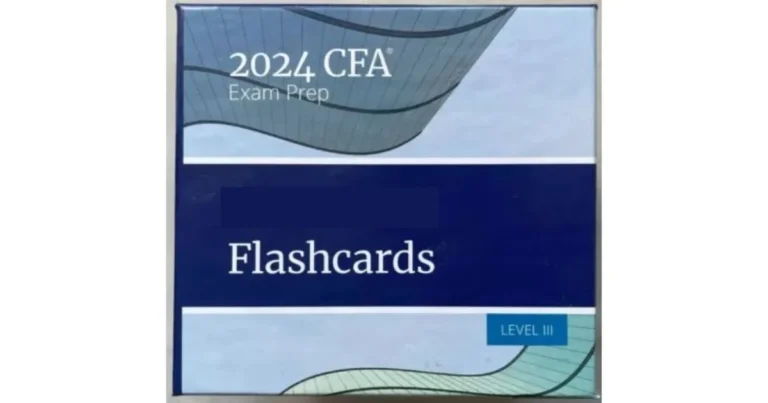
By integrating the spacing effect into our study regimen, CFA candidates can improve recall, better manage the extensive curriculum, and enhance their chances of passing the exams.
In their own Words
I recently reached out to some CFA Candidates who passed a Level 1,2 or 3 exam in the past several to understand their specific study habits, and what actually made the difference.
Here is what they had to say…
Taking notes is extremely important: I took two types of notes. One were the normal main notes which everyone usually takes down. But during my first set of revision I made revision sheets. These are incredibly crisps like no details just subheads which jog up your memory. This was around 200 pages for all 10 subjects in L2 (around 90 pages for L1). These revision notes were a game changer for me because it essentially meant I could revise the whole syllabus in 4-5 hours.
Every week day I read the reading and did the recommended exercises. (I used Kaplan btw) Every week-end I set up Review Tests for every reading I've done so far. And for every reading I set up 30-40 questions. If I reached a score of 80%-90% for a reading I considered being ready and scheduled an other test one month later. The schedule was 3-4 review tests for the new readings I studied during the week days and 1-2 for the old ones I was satisfied about one month ago.
Doozy Digest
A newsletter for CFA candidates
Subscribe for:
✔ Insightful tips
✔ Expert advice
✔ Career motivation
✔ Exam inspiration
Stay updated and subscribe today!
I think for me what helped the most was to spend most of my study time on practice questions and mix them all around all the time no focus on particular topic it helped to keep my memory fresh.” “One very nb one. Try to integrate your studying. Don’t leave long gaps between sections. If you’re studying Ecos today for example , and plan on doing 100 questions. Rather do 60 and then go back to a module you’ve done and do 40. Keeping everything fresh is honestly the hardest part when curriculum is so vast
By incorporating some of these strategies, candidates can efficiently manage their study schedules, reinforce their memory, and ultimately improve their chances of success in the CFA exams.
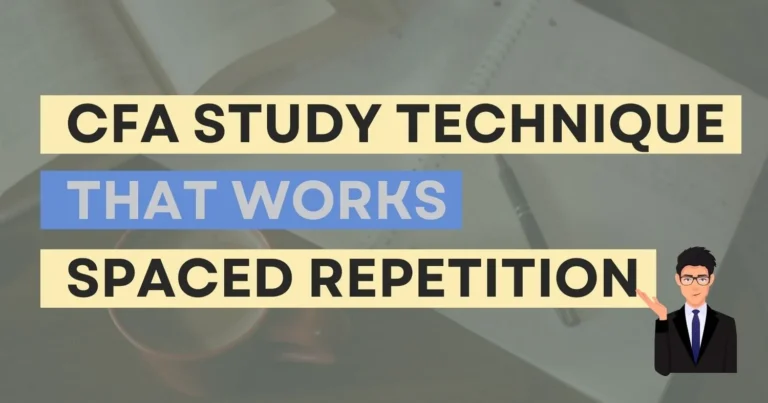
Suggestions
Plan Periodic Reviews – After studying a section, review it after one day, then after one week, and then after one month. Use a calendar or study planner to keep track of these reviews.
Stay Consistent – Maintain a consistent study schedule to build and reinforce your memory over time. Regular, spaced-out study sessions are more effective than cramming.
Take Crisp Revision Notes – Create concise revision sheets that summarize key concepts. This allows for quick reviews and reinforces your memory.


